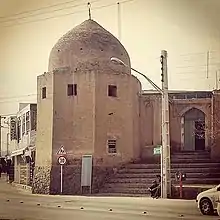Al-Rashid Billah
Abu Ja'far al-Mansur al-Rashid bi'llah ibn al-Mustarshid bi'llah (1109 – 6 June 1138) (Arabic: أبو جعفر المنصور الراشد بالله بن المسترشد بالله) was the Abbasid caliph in Baghdad from 1135 to 1136. He succeeded his father al-Mustarshid in the year 1135 as the thirtieth Abbasid caliph.
| Ar-Rashid bi'llah الراشد بالله | |||||
|---|---|---|---|---|---|
| Khalīfah Amir al-Mu'minin | |||||
 | |||||
| 30th Caliph of the Abbasid Caliphate Abbasid Caliph in Baghdad | |||||
| Reign | 29 August 1135 – 17 August 1136 | ||||
| Predecessor | Al-Mustarshid | ||||
| Successor | Al-Muqtafi | ||||
| Born | 1109 Baghdad, Abbasid Caliphate now Iraq | ||||
| Died | 6 June 1138 (aged 29) Isfahan, Abbasid Caliphate, now Iran | ||||
| Burial | |||||
| Consort | Umm al-Ja'far | ||||
| Issue | Ja'far ibn al-Rashid | ||||
| |||||
| Dynasty | Abbasid | ||||
| Father | Al-Mustarshid | ||||
| Mother | Umm al-Sada | ||||
| Religion | Sunni Islam | ||||
Biography

Like his father, al-Mustarshid, ar-Rashid made another failed attempt at independence from Seljuk Turks. To avenge his father's death, he insulted the envoy of sultan Ghiyath ad-Din Mas'ud who came to demand a heavy largess, incited the mob to plunder his palace, and then, supported by Zengi, who was equally hostile to the sultan because of the murder of Dubais ibn Sadaqah, set up a rival sultan. Mas'ud hastened to the rebellious capital and laid siege to it. Baghdad, well defended by the river and its canals, resisted the attack; but in the end the caliph and Zengi, hopeless of success, escaped to Mosul. The sultan's power restored, a council was held, the caliph deposed, and his uncle al-Muqtafi was appointed as the new caliph.
Ar-Rashid fled to Isfahan where he was assassinated by a team of four Nizari Ismailis (Assassins) in June 1138. This was celebrated in Alamut for a week.[1]
Death
Ar-Rashid was assassinated by a team of four Nizari Shia Ismailis (Assassins) in June 1138.
A Mausoleum was built on his last resting place known as Al-Rashid Mausoleum is a historical mausoleum in Isfahan city. It dates back to the Later Abbasid era of Seljuqs and is located on the northern bank of Zayanderud beside the Shahrestan bridge. This structure is the burial place of Al-Rashid the 30th Abbasid Caliph, who left his palace and fled from Baghdad to Isfahan, when Mahmud captured Baghdad. Two years later, Al-Rashid was stabbed and killed by Hashshashins in 1138. The only decorative element of the mausoleum is a stucco Kufic inscription.[2]
See also
- Ahmad ibn Nizam al-Mulk a Persian vizier of his father Al-Mustarshid.
References
- Daftary, Farhad (1992). The Isma'ilis: Their History and Doctrines. Cambridge University Press. p. 384. ISBN 978-0-521-42974-0.
- Hosseyn Yaghoubi (2004). Arash Beheshti (ed.). Rāhnamā ye Safar be Ostān e Esfāhān(Travel Guide for the Province Isfahan) (in Persian). Rouzane. p. 118. ISBN 964-334-218-2.
- This text is adapted from William Muir's 1924 book The Caliphate: Its Rise, Decline, and Fall, which is in the public domain.
ar-Rashid Cadet branch of the Banu Hashim Born: 1109 Died: 6 June 1138 | ||
| Sunni Islam titles | ||
|---|---|---|
| Preceded by Al-Mustarshid |
Caliph of Islam Abbasid Caliph 29 August 1135 – 1136 |
Succeeded by Al-Muqtafi |